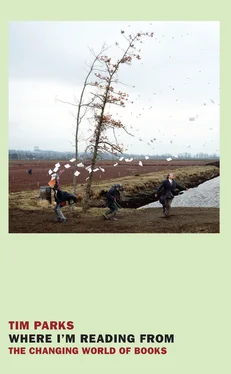In his long study of Hardy’s work, D.H. Lawrence spurned the older writer’s caution and found his novels as poisonous in their implications as they were admirable in their writing. Caught at an early age in a similar impasse between fear and courage, Lawrence resolved that every form of limitation, whether imposed by self or society, is a sin against nature. One must seize what one justly wants. No matter what. Courage is a duty, conformity a vice. Running off with a married woman, mother of three children, Lawrence invariably sought out conflict, embracing the things he still nevertheless feared. Often he delighted in imagining the outraged reviews that would inevitably result from whatever he was writing. Suffering from lung problems from an early age, he was as uncompromising with his health as he was with censorship, conformism, or inhibition. He would not accept that he had TB, and took no medical advice until it was far too late. Apparently, the solution to his early personal dilemma, which demanded freedom at all costs, did not allow him to discriminate between different kinds of constrictions. Working non-stop, traveling recklessly, he died at forty-four. A late poem has him fitting out a ship to sail toward death.
Chekhov is another who denied that he had TB and seemed to do everything to make it worse, an attitude that was all the more curious because he was himself a doctor. His work invariably shows characters torn between the need to belong to a family or social group and the fear of being imprisoned in it, of losing life’s intensity in trivial routine. Putting himself at the center of his family of origin, buying or building generous houses for his parents and siblings, he would then have a small annex built for himself near the larger home so as to remain separate from them. Flirting constantly with marriageable girls, he carefully avoided marriage and when hard pressed by the beautiful Lika Mizinova embarked on an extremely arduous journey to Sakhalin, an island penitentiary off the coast of Siberia, where he contemplated those trapped and brutalized in Russia’s worst prison community. The writing itself became a way both of being at the heart of Russian society, but also apart from it, taking no sides on political issues, writing things people didn’t expect, above all writing short stories, preferably very short, thus avoiding the imprisoning commitment of the great Russian novel.
As it progressed, Chekhov’s illness sharpened his dilemma: to seek treatment or ask for help would mean submitting to routine and restriction, which he restlessly avoided. To live intensely, as he wanted, would speed up the illness and shorten the life available. In 1901 at forty-one, now ill beyond any denial and forced to live in the warm climate of the Black Sea, Chekhov married a lively and successful actress who worked in Moscow. The frequent trips from the hot dull (as he saw it) south to the freezing and frenetic capital were, his doctor observed, the worst thing he could do for his sickness. And indeed so many of Chekhov’s characters seem to make the worst possible, if not suicidal, choices. Having spoken, in April 1904, of going to the front line of the Russian-Japanese war to get a view of the action, Chekhov died in a hotel room in the German spa town of Badenweiler where he had finally agreed to seek treatment.
It is not that I believe that one pattern fits all, simply that so many of the writers I have looked at seem permanently torn between irreconcilable positions, something that seems to feed that famous ambiguity literary critics so much admire; eventually, the dilemma driving the work either leads to death, or is neutralized in a way that prolongs life but dulls the writing. Dickens, father figure par excellence and great promoter of the happy family, writes novels that draw people of every class into a sense of national belonging, yet he simultaneously feels drastically let down by wife, children, publishers, friends, sometimes even readers. Firing his wife, mother of his ten children, he takes up with a young mistress who must be kept hidden, since what kind of identity can Dickens have if he is not Britain’s favorite and very respectable family author?
The grim later novels— Little Dorrit, Our Mutual Friend —express in all kinds of ways the impossibility of balancing these conflicting impulses. They are books of greater scope and seriousness than the earlier work, yet at the same time dissatisfying or disturbing in their failure to resolve these conflicts even aesthetically. In his fifties, shortly after pushing his wife out of the home and against the advice of his doctors, Dickens launched into one reading tour after another, often performing for hours night after night, becoming the center of attention for rapturous audiences. This was meat and drink to him, but raised even higher the cost of any revelation of his private circumstances. After the readings came the grueling journeys to arrive at wherever he had hidden his mistress, between Paris and London. Drinking heavily the while, Dickens did not surprise doctors, friends, or family when he collapsed and died at fifty-eight.
Before one last example, let me be more precise. What I am suggesting is that a novelist’s work is often a strategy (I don’t mean the author need be aware of this) for dealing with some personal dilemma. Not just that the dilemma is “worked out” in the narrative, as critics often tell us, but that the acts of writing and publishing and positioning oneself in the world of literature are all part of an attempt to find a solution, however provisional, to some deep personal unease. In many cases, however hard the writing is pushed, the solution is indeed only temporary or partial, and both author and work eventually succumb. Obviously the easiest group of authors to look at in this regard would be the suicides, Virginia Woolf, Cesare Pavese, David Foster Wallace. But to finish, let’s consider William Faulkner.
Throughout his life, when asked for biographical details Faulkner would begin by saying he was the great grandson of the Old Colonel, a man renowned for his courage, temper, energy, and vision—and a writer to boot. In contrast Faulkner saw his own father as a nobody and a loser, an opinion he seemed to share with his mother, to whom he remained close throughout his life, having coffee with her most afternoons and never missing a family Christmas if he could help it. From his earliest days he was eager to present himself as bold and courageous, inventing in 1918 a bizarre story of having crashed a warplane while celebrating the end of the war. For years he affected a limp supposedly resulting from the crash, though at the time he had never piloted a plane at all. His brother was actually wounded in the war. Faulkner’s first novel focuses on a soldier returning home a hero, but so badly wounded that he dies.
Like Thomas Hardy, Faulkner eventually invented a fictional territory of his own where his novels could all take place in relation to each other. Acts of courage in Yoknapatawpha County—usually a very physical, manly courage, but also the courage to claim the woman you really desire—end up, as in Hardy’s novels, in wounds, disaster, and death. Like Hardy, Faulkner married a woman he was eager to betray (and did) but never able to walk out on. Community in the South is presented as a tremendous, insuperable burden that one can neither escape nor overcome. The only freedom available is the freedom, the courage, to live slightly apart, not to engage with the world or women, like Ike McCaslin, hero of The Bear .
Over the years Faulkner’s writing became both a solution to and a representation of the conflicting impulses that tormented him. His stylistic experimentalism became an act of courage in itself, allowing him to criticize the genuinely war-wounded and mythically courageous Hemingway for not being brave enough to experiment with his writing and risk failure. Yet Faulkner’s experimentation is never liberating: his prose gives us the impression of a wild, would-be heroic energy pushing through an impossibly dense medium, shoving aside negative after negative to reach the brief respite of a positive verb, losing itself in a heavy slime of ancestors and ancient wrongs. It is not a world in which one could hope to become the courageous man Faulkner wished to be. From the black community, Faulkner told a friend, we can learn “resignation.”
Читать дальше












